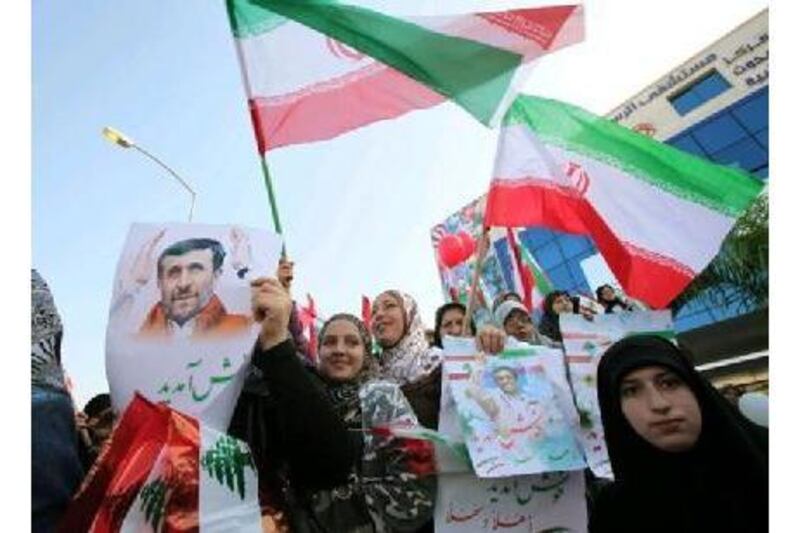BEIRUIT // Mahmoud Ahmadinejad promised yesterday that Iran would stand by Lebanon in facing aggression from neighbouring Israel.
Mr Ahmadinejad, on the first state visit by an Iranian president to Lebanon, was greeted by tens of thousands of supporters, most of them Shiite, lining streets from Beirut's airport waving Lebanese and Iranian flags to show their gratitude to the Islamic republic for its aid.
After a quick tour of a Palestinian refugee camp near the airport, Mr Ahmadinejad met the Lebanese president, Michel Suleiman, in the presidential palace near Beirut. There, the Iranian leader pledged US$450 million (Dh1.6billion) in additional aid from Tehran and signed a defence cooperation agreement, the details of which were not disclosed. "The Iranian nation will always stand beside the Lebanese nation and will never abandon them … We will surely help the Lebanese nation against animosities, mainly staged by the Zionist regime," Mr Ahmadinejad told reporters afterward, referring to Israel. He also urged the "full liberation of occupied territory in Lebanon, Syria and Palestine".
In a message apparently aimed at easing tensions between the pro-western government and Tehran's ally Hizbollah, Mr Ahmadinejad said he supported a strong and unified Lebanon. Hizbollah and the Sunni-led government of Saad Hariri, the prime minister, are at odds over a UN investigation into the 2005 assassination of Mr Hariri's father, Rafik. Much of Lebanon is convinced that Hizbollah, and possibly Iran itself, might be implicated in the killing.
A vocal critic of the Iranian president's visit, Samir Geagea, had warned the Lebanese would welcome the "president of Iran" but not the "president of parts of Lebanon" - a clear reference to Hizbollah's reputation for maintaining its own state. Yesterday, however, Mr Geagea, a member of parliament, called Mr Ahmadinejad's statements "moderate". The US and Israel expressed concern over Mr Ahmadinejad's visit, saying support for Hizbollah undermines Lebanese sovereignty. "We reject any efforts to destabilise or inflame tensions within Lebanon," the US secretary of state, Hillary Clinton, said. "We would hope that no visitor would do anything or say anything that would give cause to greater tension or instability in that country."
Among those who turned out to welcome the Iranian leader on the first day of a scheduled two-day visit, there was nothing but enthusiasm. Firas Zaghloul, a 34-year-old taxi driver from Beirut's southern suburbs, a bastion of support for both Iran and Hizbollah, said he had brought his son to thank Iran for its role in liberating Lebanon from Israeli occupation in 2000. "He is a great man. His country helped us so much we have to appreciate them," Mr Zaghloul said. "The best thing they gave us is the resistance. Our Islamic resistance is our shield, and without the full support of Iran we would never have been able to liberate the land."
Abbas Nahas, 61, arrived in the capital by bus from the southern village of Beit Leif to express gratitude to the government that rebuilt his home after the 2006 war with Israel. "Why I'm here? I'm here to appreciate all they gave us," said Mr Nahas, a schoolteacher, describing how Iranian aid rebuilt his home and village after the war. Besides spending millions of dollars to help train and equip Hizbollah, the Iranian government and assorted charities donated additional millions after the 2006 war to reconstruct the large swaths of south Lebanon shattered by the 34-day conflict.
Mr Ahmadinejad was due to see first-hand the results of Tehran's aid during a tour of southern Lebanon this morning. At a rally last evening in the Hizbollah stronghold of Haret Hriek in Beirut, Mr Ahmadinejad jumped down from the stage and shook hands with dignitaries in the crowd, which numbered in the hundreds of thousands. Speaking through an Arabic translator, Mr Ahamdinejad told the cheering crowd that the difference between the resistance and its opponents was the same as "light against darkness" and that the West only cares for freedom and liberty as slogans.
He also defended the role of Hizbollah as an armed entity within Lebanon, saying, "to resist Zionism is never a crime". In Iran, state-run television gave live coverage to the first day of Mr Ahmadinejad's visit. The network and other news outlets said the welcome shown by the Lebanese people was proof of Lebanon's support for the Islamic Republic and a victory for Iranian diplomacy. "The Israel-US axis that had opposed the Iranian president's visit has been checkmated by the huge welcome offered to the Iranian president," Seyed Mohammad Sadegh al Hosseini, a Middle East analyst told the semi-official Iranian Students News Agency.
Many Iranian officials and politicians interviewed for the occasion also said Mr Ahmadinejad's expression of support for Lebanon's national unity showed that Tehran would not deal with its regional enemies by fighting a proxy war through sympathetic factions in Lebanon. "If by this visit Mr Ahmadinejad meant to confront various Lebanese [political and religious] groups he wouldn't have made telephone calls to Arab leaders such as the leaders of Saudi Arabia, Jordan and Syria before taking the trip [to Lebanon]," the chairman of the parliament's foreign policy committee, Heshmatollah Falahatpisheh, was quoted by IRNA as saying.
* Additional reporting by Maryam Sinaiee in Tehran and by Agence France-Presse and Reuters





